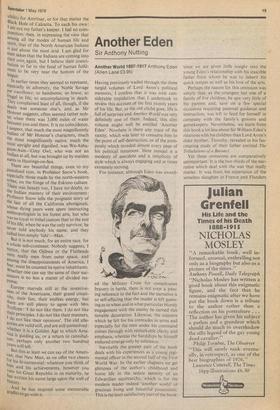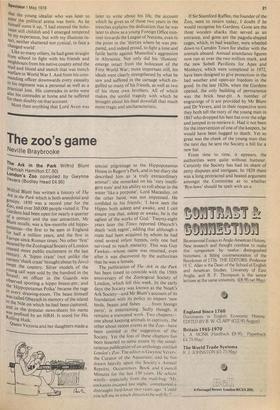Another Eden
Sir Anthony Nutting Another World 1897-1917 Anthony Eden (Allen Lane £3.95)
Having previously waded through the three turgid volumes of Lord Avon's political memoirs, I confess that it was with considerable trepidation that. I undertook to review this account of the first twenty years of his life. But, as the old cliché goes, life is full of surprises and Another World was very definitely one of them. Indeed, this slim volume might well be entitled 'Another Eden'. Nowhere is there any trace of the vanity, which was later to consume him to the point of self-destruction, or of the pomposity which invaded almost every page of his political testament. Here instead is a modesty o'f anecdote and a, simplicity of style which is always engaging and at times extremely moving.
For instance, although Eden was award ed the Military Cross for conspicuous bravery in battle, there is not even a passing reference to the fact and the narrative is so self-effaCing that the reader is left guessing as to when and in what particular bloody engagement with the enemy he earned this notable decoration. Likewise, the concern which he felt for his comrades in arms and especially for the men under his command comes through with remarkable clarity and emphasis, whereas the hardships he himself endured emerge only by inference.
Inevitably the greater part of the book deals with his experiences as a young regimental officer in the second half of the First World War. In the earlier chapters we get glimpses of the author's childhood and home life in the sedate serenity of an Edwardian squirearchy, which is for the modern reader indeed 'another world of , gracious living and beautiful possessions. This is the least satisfactory part of the book,
since we are given little insight into the young Eden's relationship with his irascible father from whom he was to inherit his quick temper as well as his love of the arts.
Perhaps the reason for this omission was simply that, as the youngest but one of a family of five children, he saw very little of his parents and, save on a few special occasions requiring paternal guidance and instruction, was left to fend for himself in company with the family's grooms and gamekeepers. Nevertheless, we learn from this book a lot less about Sir William Eden's relations with his children than Lord Avon's elder brother; Timothy, revealed in his fascinating study of their father entitled The Tribulations of a Baronet.
Yet these omissions are comparatively unimportant. It is the two thirds of the narrative which deal with the war that really matter. It was from, his experience of the senseless slaughter in France and Flanders
that the young idealist who was later to enter the political arena was born. As he himself sums it up, 'I had entered the holocaust still childish and I emerged tempered by My experience, but with my illusions intact, neither shattered nor cynical, to face a
Chang ed world'. ' Like so many others, he had gone straight from school to fight with his friends and neighbours from his native county amid the Mud and blood and stench that was trench warfare in World War I. And from his comnlanding officer downwards every casualty in his regiment was a personal as well as a Practical joss. His comrades in arms -were also his comrades at home and he suffered for them doubly on that account. More than anything that Lord Avon was later to write about his life, the account which he gives us of those two years in the trenches explains the dedication that he was later to show as a Young Foreign Office minister towards the League of Nations, even to the point in the 'thirties where he was prepared, and indeed proud, to fight a lone and futile battle against Mussolini's aggression in Abyssinia. Not only did his Illusions' emerge intact from the holocaust of the First World War; more important still, his ideals were clearly strengthened by what he saw and suffered in the carnage which engulfed so many of his friends, as well as two of his three own brothers. All of which makes the sordid tragedy with which he brought about his final downfall that much more tragic and uncharacteristic.



































 Previous page
Previous page